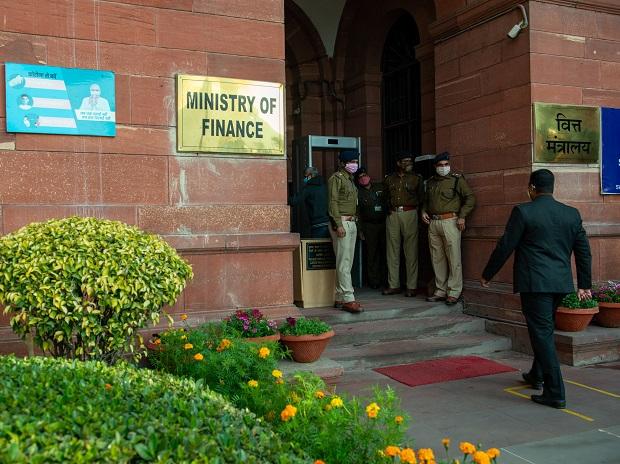[ad_1]
The finance ministry on Monday cautioned the re-emergence of the twin deficit problem in the economy, with higher commodity prices and rising subsidy burden leading to an increase in both fiscal deficit and current account deficit. It’s also the first time the government has explicitly talked about the possibility of fiscal slippage in the current fiscal year.
“As government revenues take a hit following cuts in excise duties on diesel and petrol, upside risk to the budgeted level of gross fiscal deficit has emerged. An increase in the fiscal deficit may cause the current account deficit to widen, compounding the effects of costlier imports, and weaken the value of the rupee, thereby further aggravating external imbalances, creating the risk (admittedly low, at this time) of a cycle of wider deficits and a weaker currency,” the finance ministry said in its latest Monthly Economic Review.

The report said rationalising non-capex expenditure has thus become critical, not only for protecting growth supportive capex but also for avoiding fiscal slippages.
The ministry had earlier hinted that India’s fertiliser subsidy bill for FY23 could rise to around Rs 2.5 trillion against the Budget Estimate of Rs 1.05 trillion because of a global supply shortage amid the war in Ukraine. Apart from the already announced Rs 1.10-trillion increase in fertiliser subsidy, the Narendra Modi government’s decision to extend the PM Garib Kalyan Anna Yojana (PMGKAY) until September shall increase the food subsidy outlay for FY23 to Rs 2.87 trillion, from the Budget Estimate of Rs 2.07 trillion.
ALSO READ: Need to protect consumers from consolidation of internet-economy: Govt
The impact of the latest round of excise duty cuts on petrol and diesel will be around Rs 85,000 crore for the year, while the recent import duty cuts on other items shall lead to a revenue foregone worth Rs 10,000-15,000 crore. Additionally, the government’s decision to provide a subsidy of Rs 200 per gas cylinder (up to 12 cylinders) to over 90 million beneficiaries of the Pradhan Mantri Ujjwala Yojana will cost Rs 6,100 crore a year to the exchequer.
The report said even as the world is looking at a distinct possibility of widespread stagflation, India is at low risk of stagflation, owing to its prudent stabilisation policies. Stagflation is a situation in which the inflation rate is high, the economic growth rate is slow, and unemployment remains steadily high.

The high-wire balancing act between maintaining growth momentum, restraining inflation, keeping the fiscal deficit within budgetary target and ensuring a gradual evolution of the exchange rate in line with underlying external fundamentals of the economy is the challenge for policymaking this financial year and successfully pulling it off will require prioritising macroeconomic stability over near-term growth, the report said.
Even as the Reserve Bank of India increased policy rates by 90 basis points in a month time to fight record inflation levels in the economy, the finance ministry brought out the limitations of raising interest rates. “Tightening fiscal and monetary policies can however address inflation only from the demand side, insofar as they are able to smother pent-up demand and roll-back stimuli announced as part of the Covid-19 relief package. Simultaneously, from the supply side, trade disruptions, export bans and the resulting surge in global commodity prices will continue to stoke inflation as long as the Russia-Ukraine conflict persists and global supply chains remain un-repaired,” it added.
The finance ministry said the economy’s medium-term growth prospects remain bright as pent-up capacity expansion in the private sector is expected to drive capital formation and employment generation in the rest of this decade. “Near-term challenges need to be managed carefully without sacrificing the hard-earned macroeconomic stability,” it added.
 Dear Reader,
Dear Reader,
Business Standard has always strived hard to provide up-to-date information and commentary on developments that are of interest to you and have wider political and economic implications for the country and the world. Your encouragement and constant feedback on how to improve our offering have only made our resolve and commitment to these ideals stronger. Even during these difficult times arising out of Covid-19, we continue to remain committed to keeping you informed and updated with credible news, authoritative views and incisive commentary on topical issues of relevance.
We, however, have a request.
As we battle the economic impact of the pandemic, we need your support even more, so that we can continue to offer you more quality content. Our subscription model has seen an encouraging response from many of you, who have subscribed to our online content. More subscription to our online content can only help us achieve the goals of offering you even better and more relevant content. We believe in free, fair and credible journalism. Your support through more subscriptions can help us practise the journalism to which we are committed.
Support quality journalism and subscribe to Business Standard.
Digital Editor
[ad_2]
Source link

 Dear Reader,
Dear Reader,